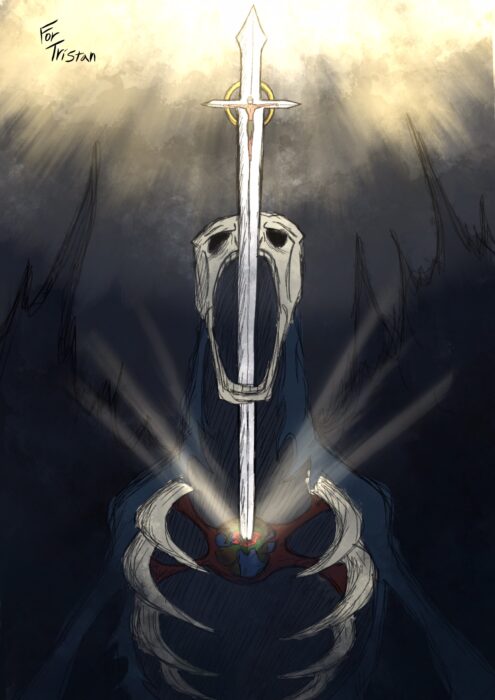
“The hour has come for the Son of Man to be glorified. Truly, truly, I say to you, unless a grain of wheat falls into the earth and dies, it remains alone; but if it dies, it bears much fruit. Whoever loves his life loses it, and whoever hates his life in this world will keep it for eternal life. If anyone serves me, he must follow me; and where I am, there will my servant be also.”
– John 12:23-26
If A Seed Dies…
Heavy, heavy words in this section. It begins with Jesus referring to His impending death as His glory. “The hour has come,” He says, “for the Son of man to be glorified…” And then He immediately begins to talk about a seed that must fall into the ground and die if it is to bear any fruit. Indeed, Christ’s death will be the death of the seed, and all true fruit to the glory of God that has ever and will ever be borne by humanity will prove to have been a result of this seed’s death and resurrection. Consider it, apart from the sin-bearing, wrath-absorbing work of Christ on the cross, no human at any time could be right with God and so glorify Him. This means that any eternally good work performed by grace from Adam to the last man in history, will prove to be a fruit of the death and resurrection of Jesus Christ.
Jesus’ death is His glorification, His great accomplishment, His supreme act of God-exalting, Bride-redeeming, History-achieving love. Yes, Love will die for the beloved in order to secure the good of the Beloved (in this case, “much fruit” to the glory of God).
But here’s where the heaviness sets in. If we are to follow Christ, we cannot simply be observers. We cannot merely stand on the fringes and celebrate the aesthetic merits of His dying and rising love. If we are His then we will follow Him. If we are His then we will be where He is (v.26). We will be where He is right now–in the blood and mud of Love’s trenches in the fallen world–and we will be where He is then–at the banquet table of Trinitarian joy in the New Heavens and Earth. However, if we have not joined Him in the “now” what is to make us think we will join Him in the “then.” I do not imply that our service and suffering in this life earn us a seat at the table. However, it is true that service and the embrace of suffering for the sake of Christ-exalting love in present manifest the sort of heart that is able–by grace–to sit at that table in the future. Let’s look more closely at these things.
How Not To Love Our Lives
“Whoever loves his life loses it, and whoever hates his life in this world will keep it for eternal life.”
– John 12:25
At first these words of Christ sound strange and abrasive. He wants us to hate our lives? Not in the way you might think. Lets examine what “love” and “hate” mean in this sentence.
Notice that the call to not love our lives comes directly after Jesus has said He is going to lay down His life in order to glorify God. This means that “loving our lives” –as Jesus uses the phrase here–corresponds to a refusal to “die” in the way that Christ is going to die. When Jesus calls His followers not to love their lives, He is not saying that it is wrong to enjoy the good gifts that God gives, He is not saying it’s wrong to rejoice in family and friends, or that it is sinful to be glad in the beauty of nature or the sweet intimate moments of relational life. Rather, He is warning against a self-protective, security-treasuring, comfort-maintaining refusal to enter the cruciform path of love.
Eternally deadly “love of life” consistently refuses to enter the self-death that is Christ-like love and instead chooses to remain behind the white picket fence of “my place.”
Hate Our Lives?
And with that we begin to see in what sense Jesus calls us to hate our lives. The hatred Jesus is talking about here is not a stoic, joyless, ascetic dislike of conscious existence. It is not a “woe is me” mentality or the cultivation of suicidal longings. It is not a disdain for gladness in self and others. Rather, it is a willingness to embrace the self-giving of love. it is a readiness to follow Jesus Christ, even into the grave (our “final” grave, yes, but also into the many little graves and many little daily deaths that love demands), because He has become our life and treasure. If anyone is to be His servant, then they will follow Him, they will be where He is…….and where is Jesus? Where is Jesus? He is in the trenches, He is in the slums, He is in the mental facilities and hospitals, He is in the hard and sad places….He is with the broken in the ash heaps…..where He has always been (Psalm 113:7).
May the Lord give us sensitive hearts to know “where” Christ is our our cities and towns and neighborhoods and families…..and may He give us the grace to enter the self-giving path of love and follow Him there.
And notice also that Jesus says that this “hatred” of our lives–that is, our willingness to lay them down in the cause of Christ-exalting love–is necessary for eternal life. Now, remember that “eternal life” is most essentially knowing and loving God (John 17:3). To know and love God in Christ is not the way to eternal life, it is eternal life. With this in mind, Jesus is saying that a self-protective, comfort-treasuring, pleasure-preserving life is an impediment to knowing God, whereas a self-giving, out-pouring, eternally-minded life is the path to knowledge of Him. If we would know and rejoicing in the living God, let us–by grace– leverage our lives for the cause of Christ-like love.
With Him on the Cross and at the Table
In conclusion, I want to note an interesting parallel between Jesus’ words here in 12:26 and those He will speak later in 14:3,
“Where I am, there will my servant be also…” – John 12:26
“I will come again and will take you to myself, that where I am, you may be also.” – John 14:3
In John 12:26, the “where” that Jesus is talking about is–most immediately–the self-giving death of love. And in 14:3, the “where” is in joyful communion with the Father. The cruciform pattern of suffering that leads to glory and sorrow that blossoms in joy is clear and beautiful.
Where Jesus is, those who love and follow Him will also be. In the present life, with Him means we will be in the trenches, walking the “Via Dolorosa” with our Lord, and–to greater and lesser degrees–crucified with Him on the cross of love’s suffering. I do not mean to say that the Christian’s life is all gloom in this world, on the contrary there are depths and heights of joy to be had following our Lord….but it remains universally true that, in a fallen world, love always dies, in big and small ways.
However, after death, after we–by grace–have walked through our appointed “crucifixion” and “burial” with Him, we will be with Him where He is in the Intra-Trinitarian joy of Father, Son, and Spirit. We will rejoice in the ecstasies of God’s own gladness in Himself. Oh…..may we always be with Jesus where He is…….may we always be with Jesus where He is…..starting now……in Christ’s name I ask, amen.



